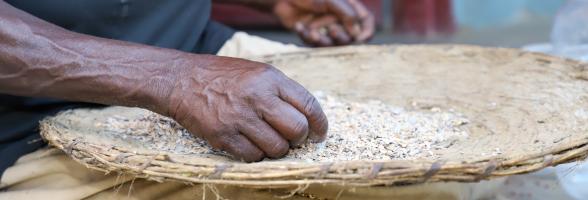CONTEXT
In Uganda, where a significant portion of the population is employed in agriculture, land ownership plays a crucial role in livelihoods. Uganda is blessed with fertile land, estimated by Radar Africa to be sufficient to feed 200 million people. Beyond that land is a means of production that is essential in development.
According to the 1995 Constitution Article 273 (1) and the Land Act 1998 Cap. 2004, land in Uganda belongs to the citizens and is conferred to them. These laws also prohibit discrimination against land ownership based on gender.
However, despite these legal provisions, women in Uganda, who make up 50.47% of the population, own less than 20% of the land. This gap in land ownership is concerning and highlights the need for action.
The purpose of the Advocacy on Women's Land and Property Rights project is to empower women and ensure that their rights to land and property are respected, promoting effective and sustainable human development. Key to achieving this goal is recognizing the importance of women's rights in eradicating poverty and supporting gender equality which is Goal 3 of the Millennium Development Goals (MDGs).
To achieve gender equality in land ownership, it is crucial to break down barriers, challenge discriminatory laws, and address social norms and patriarchal systems that hinder women's access to land. By doing so, we can work towards a more equitable society where women have equal opportunities to own and benefit from land, contributing to their empowerment and the overall development of Uganda.
Oxfam in Uganda with funding from Oxfam International will work with local partners in the districts of Lira and Kitgum to promote the land and property rights of Women by training grassroots women councillors in transformative leadership, women’s rights and creating awareness of women’s rights by using media platforms like radios to send out messages.
PROJECT AIM:
- To empower women to collectively advocate and negotiate for practical women’s ownership and control of their land.
EXPECTED RESULTS:
- Transformative leadership approaches build the agency of grassroots women leaders and organizations to mobilize and access platforms at the national, regional, and global levels, as well as locally in collective tenure systems, to claim and defend women’s land rights in the context of the climate crisis.
- The voices of grassroots women leaders to be able to claim and front their rights to land and natural resources shape the terms of debate on gender inequality and women’s rights and highlight their relation to climate change and its impacts.
- Leaders and decision-makers at national, regional, and global levels are held accountable for adopting and implementing commitments toward securing women’s land and natural resource rights in the context of the climate crisis.
IMPLEMENTING PARTNERS:
Local Partners
- Area Lands Committees, District Land Boards and Traditional Institutions, farmers, secondary schools and women groups, women land rights organizations and movements
- Government of Uganda (Ministry of Lands Housing and Urban Development, Ministry of Animal Industry and Fisheries, Ministry of Local Government),
- Sugar Cane Companies, community members,
- Organisations like PELUM Uganda, Land Justice Network, LANDnet Uganda, Women Land Rights Movement and ESAFF Uganda.
International Partners
- International Land Coalition (ILC),
- Prindex
- Landesa
- Global Land Alliance,
FUNDED BY:
- Oxfam International.
BUDGET:
- €22,929.47
PROJECT DURATION
- 16 months (2023-2024)
GEOGRAPHICAL COVERAGE:
- Kitgum and Lira districts of Northern Uganda.

